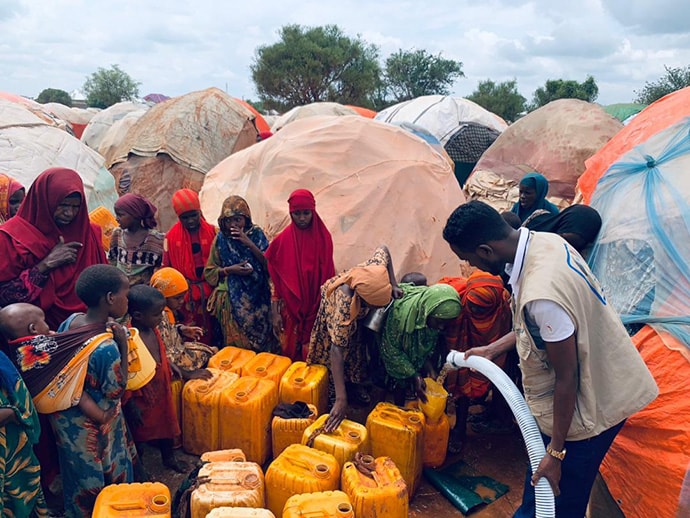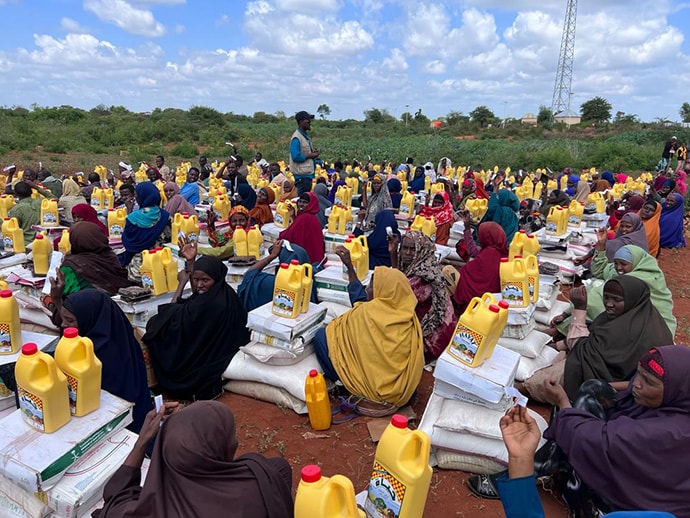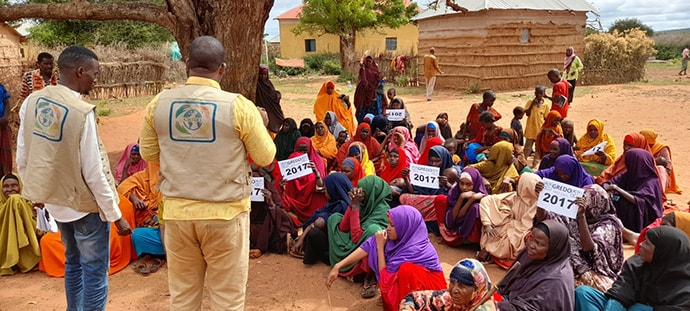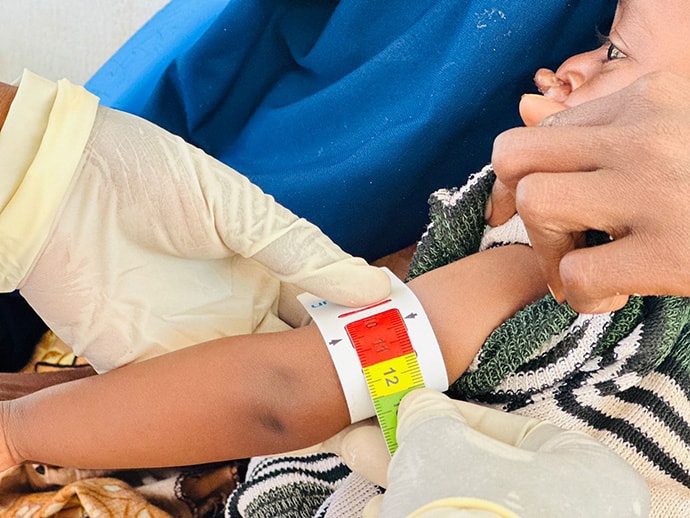By Amber Cortes

Emergency water supplied by GREDO Somalia. Photo: GREDO
‘Iskaashato ma kufto,’ goes a Somalian proverb: “If people support each other they do not fall.” It’s a sentiment that Cabdinasir Adan, the Food Security and Livelihoods Manager at Gargaar Relief and Development Organization (GREDO), can get behind.
According to Cabdinasir, Somalia faces urgent situations once or twice every year due to frequent droughts, armed conflict and flooding. These natural disasters, compounded by climate change and environmental degradation, continue to strain the capacity of humanitarian aid and underscore the urgent need for resilience-building efforts in Somalia.
One of the most pressing issues facing Somalia today is recurrent droughts, which devastate livelihoods, exacerbate food insecurity, and contribute to displacement and conflict. Last year Somalia faced the worst drought in decades and impoverished millions of people.
Climate change-related shocks, such as flooding and long dry periods (drought) are frequent and common in Somalia. Other climate effects felt include hotter weather conditions and delayed, earlier, and quicker cessation rains compared to historic months of rainy seasons. Climate change consequences lead to failed or severely reduced local food production causing chronic food insecurity, loss of livestock and key other assets for rural households, severe water shortages, high malnutrition levels, degraded land, and severe disruptions of livelihood and economic sources. Climate change impact is also compounded by armed conflict and worsening the situation through increased displacements, heightened protection risks, and constrained livelihood and economic activities.

Emergency food distribution supplied by GREDO Somalia. Photo: GREDO
More than 70% of Somali people depend on livestock and agriculture. The majority live in rural areas depending on the food and incomes they get from this ecosystem of resources (i.e. farmlands, water, and rangeland products). Climate effects on this livelihood base have contributed to sharp declines in food production and mass rural-to-urban migration, increasing the number of internally displaced households in urban areas. Climate and conflict induced humanitarian crises affects millions of the most vulnerable Somali people, particularly women and children, people living with disability, elderly, marginalized, and other minority groups.
In recent years, Somalia has also grappled with severe flooding, particularly along the Shabelle and Juba rivers, leading to displacement, destruction of infrastructure, and increased risk of waterborne diseases. The country is also vulnerable to tropical cyclones and tropical storms which threaten coastal communities.
In 2024, 6.9 million people in Somalia will need humanitarian assistance, according to the UN Office for the Coordination of Humanitarian Affairs (OCHA).
With a background in Dryland Agriculture and a decade-long commitment to serving vulnerable communities, Cabdinasir embodies the values that drive GREDO.
Over email, Cabdinasir says his path into humanitarian work was spurred by a deep-seated desire to alleviate the suffering of vulnerable people and communities grappling with extreme poverty, climate shocks, and conflict-induced crises.
“More specifically,” he writes, “I’m interested working with [the] most vulnerable groups such as children and their families, people living with disability and unemployed youth.”
Over the past decade, he has been actively engaged in responding to humanitarian emergencies and facilitating community development initiatives.

Photo showing community mobilization during 2023 drought emergency. Photo: GREDO
Established in 1992, GREDO provides essential services to communities affected by conflict, droughts, and other emergencies. With its mission to foster a prosperous and dignified society, GREDO has been instrumental in delivering vital assistance to millions of individuals across South and Central Somalia.
GREDO’s holistic approach to humanitarian relief and development encompasses a wide array of services, including food security, livelihoods support, nutrition, healthcare, and WASH (Water, Sanitation, and Hygiene). By working closely with local communities and stakeholders, GREDO strives to address the unique needs of each community while promoting inclusion, gender equality, and human rights.

Treatment of malnutrition at emergency health and nutrition site, 2023. Photo: GREDO
In his role as the Food Security and Livelihoods Manager at GREDO, Cabdinasir shoulders a multitude of responsibilities–from overseeing activities to proposing innovative approaches tailored to the fragile context of Somalia, his role encompasses strategic planning, project coordination, and stakeholder engagement.
At the core of GREDO’s philosophy lies a profound belief in the collective action of stakeholders and the resilience of local communities. Through food assistance, cash transfers, emergency water, sanitation facilities, and healthcare services, GREDO’s emergency relief efforts play a crucial role in saving lives and alleviating suffering.
Monitoring and evaluation of these relief efforts is paramount for GREDO, including frequent site visits, encouraging third-party collaborations, and checking feedback channels, GREDO strives to continuously assess and improve its interventions to better serve these communities in need.
And their efforts are having an impact. Since their founding, GREDO has been able to provide 1.3 million people in south and central Somalia with live-saving food assistance, drinking water, life-saving treatments for malnourished children and their mothers.
Amidst the backdrop of ongoing global challenges, including climate change, natural disasters, and conflict, Cabdinasir remains deeply concerned about the plight of vulnerable populations in Somalia. But he remains “hopeful to see significant reduction of people suffering from humanitarian crises and who can cope through their own capacities.”
GREDO Somalia is committed to working with communities to support their capacity to withstand climate vulnerabilities through locally lead or community lead practices. Vulnerabilities associated with climate change are addressed by working with the community to use practices that are not harmful to the environment, that strengthen community preparedness to reduce loss and damage, and that promote approaches or innovative solutions that build community and individual resilience while supporting sustainable development. Learn more at gredosom.org.